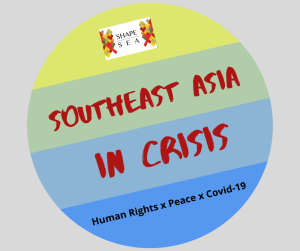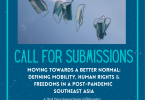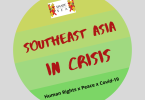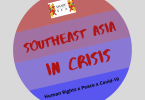Kristine Mari T. MirandaGraduate Student, College of Social Work and Community Development, University of the Philippines
 While COVID-19 may be a global health crisis, it has brought us actually deeper into structural and interconnected problems at the local and national levels. It exposed social, economic, and political glitches that have been sidelined in the past. These issues continue to expand without inclusive policies, proper implementation, and clear guidelines being established by the government. We may avoid the occurrence of a specific problem for a short period of time but if we concentrate on just providing band-aid solutions without targeting the root cause of the problem, we may end up digging ourselves deeper into a rabbit ™s hole.Inequalities are at their peak during times of disasters and crises. The COVID-19 pandemic is a test of action for the government on how it could rouse public participation and inclusiveness without leaving anyone behind. If interventions do not take these into consideration, not only will existing inequalities be exacerbated, the physical, mental, and psychosocial well-being, safety, and security of those belonging to the most disadvantaged sectors will be adversely impacted (UP COVID-19 Pandemic Response Team, 2020). Speaking of exclusion, it is crucial to be mindful of the plight of those who live in depressed, underserved communities throughout the country. How much do we actually know about their situation? Many relief programs or commonly called as ayuda are being implemented with little evidence-based knowledge and understanding of their needs and challenges. Furthermore, people at margins are being treated as beneficiaries, but never partners to combat this pandemic. The government may be concerned but definitely lacked the willingness and ability to alleviate the deprived from the negative impacts of this crisis.The continuous extension of the Enhanced Community Quarantine (ECQ) had exacerbated many facets of this public health crisis. For instance, the Social Amelioration Program (SAP), indicated in the Republic Act No. 11469, also known as the Bayanihan to Heal As One Act, earmarked billions of pesos worth of cash assistance for 18 million poor households. However, as of May 11, only 16.1 million or 89.42% of beneficiaries were able to claim their cash assistance a day after the second adjusted deadline (Inquirer.net, 2020).The government forced people to stay home, but failed to provide them with basic assistance they need to survive on a daily basis. This public health crisis has evolved to be an economic and social disaster, whereby human rights and freedoms are disrespected. On May 1, Rappler.com, an online news network, reported that there were at least 38,817 individuals who have been arrested for allegedly violating the protocols of the ECQ. Some of these quarantine violators, mostly from marginalized communities, are merely finding ways to survive. However, their needs seem to be sidelined by authorities who are mandated to ensure their well-being and rights. Apparently, those who are in power would never understand struggles on the ground, because marginalized peoples were never included in the fight against the pandemic. As the number of cases rise every day, more and more people suffer from the lack of systematic governance of COVID-19.When the initial step en route to social inclusion is not achieved, the very nature of dealing with the pandemic has already failed. During this crisis, the government should also let the people be involved in the process.Local Government Units (LGUs) must be given adequate resources, freedom and political will to initiate and implement programs that address concerns of their constituents. Different sectors should be consulted first concerning their situations before coming up with policies and programs. This will ensure that government service caters to the needs of everyone, especially, the disadvantaged, the poor, and the marginalized.This crisis revealed a fragile system that only serves the interests of an elite few. Those at the fringes of society were never given a fighting chance to survive, all the more, to contribute to policies and programs that would elevate them from deprivation and suffering. Moreover, the government should ensure that rights and freedoms are fully protected. It should always provide a safe and open space for voices from the ground to speak their truth, as well as dissent and criticism from the public. Lastly, active collaboration among people ™s organizations, community-based organizations, and other civil society groups should be strengthened throughout this process of mitigating the spread of COVID-19 and beyond.Reference:Al-Adhami, R. (2011, May 3). The significance of social inclusion for development. United Nations Research Institute for Social Development. Retrieved from http://www.unrisd.org/80256B3C005BE6B5/(httpNews)/777A23064D897C88C125788500507772?OpenDocument= on 10 May, 2020.Biseneo, X.L. (2020, April 22). The pre-COVID-19 plight of the poor and government ™s old ways. IBON.org. Retrieved from https://www.ibon.org/the-pre-covid-19-plight-of-the-poor-and-governments-old-ways/ on 15 May, 2020.De Silva, R. (2020, May 4). COVID-19: Its impact on the Philippines “ Parts I, II, III, and IV of V. Europe Solidaire Sans Frontieres. Retrieved from http://www.europe-solidaire.org/spip.php?article52772 on 14 May, 2020.International Federation of Red Cross and Red Crescent Societies (IFRC). (2020, March 30). How to consider protection, gender and inclusion in the response to COVID-19. Retrieved from https://media.ifrc.org/ifrc/wp-content/uploads/sites/5/2020/03/Technical-guidance-note-for-PGI-and-health-staff-30March20.pdf on 11 May, 2020.Lalu, G.P. (2020, May 11). A day after SAP deadline, only 89% of beneficiaries got aid ”DSWD. Inquirer.net. Retrieved from https://newsinfo.inquirer.net/1273119/a-day-after-sap-deadline-only-89-of-sap-beneficiaries-got-aid-dswd on 14 May, 2020.Mercado, L. (2020, March 13). Ideas for a pro-poor and pro-women approach to COVID-19. Oxfam in Asia. Retrieved from https://asia.oxfam.org/latest/blogs/ideas-pro-poor-and-pro-women-approach-covid-19 on 15 May, 2020.Official Gazette of the Republic of the Philippines. (2020, March 24). Republic Act No. 11469, s. 2020. Retrieved from https://www.officialgazette.gov.ph/2020/03/24/republic-act-no-11469/ on 25, May 2020.Talabong, R., & Gavilan, J. (2020, May 1). Philippines still stuck with drug war blueprint. Rappler. Retrieved from https://www.rappler.com/newsbreak/in-depth/259493-policing-coronavirus-pandemic-philippines-still-stuck-drug-war-blueprint on 14 May, 2020.University of the Philippines COVID-19 Pandemic Response Team. (26 April, 2020). Addressing the immediate needs of all, especially the most vulnerable sectors: Analysis and recommendations. Retrieved from https://www.up.edu.ph/addressing-the-immediate-needs-of-all-especially-the-most-vulnerable-sectors-analysis-and-recommendations/ on 11 May, 2020.Villamor-Barrameda, T. (2019). Framing Research in Social Development Thinking and Practice: The DSD Experience. Philippine Journal of Social Development, 12, 94-113.Voices for Interactive Choice and Empowerment. (2020, April 12). Corona Pandemic: The whole-of-society aaproach. Retrieved from https://voicebd.org/2020/04/12/corona-pandemic-the-whole-of-society-approach/ on 13 May, 2020.
While COVID-19 may be a global health crisis, it has brought us actually deeper into structural and interconnected problems at the local and national levels. It exposed social, economic, and political glitches that have been sidelined in the past. These issues continue to expand without inclusive policies, proper implementation, and clear guidelines being established by the government. We may avoid the occurrence of a specific problem for a short period of time but if we concentrate on just providing band-aid solutions without targeting the root cause of the problem, we may end up digging ourselves deeper into a rabbit ™s hole.Inequalities are at their peak during times of disasters and crises. The COVID-19 pandemic is a test of action for the government on how it could rouse public participation and inclusiveness without leaving anyone behind. If interventions do not take these into consideration, not only will existing inequalities be exacerbated, the physical, mental, and psychosocial well-being, safety, and security of those belonging to the most disadvantaged sectors will be adversely impacted (UP COVID-19 Pandemic Response Team, 2020). Speaking of exclusion, it is crucial to be mindful of the plight of those who live in depressed, underserved communities throughout the country. How much do we actually know about their situation? Many relief programs or commonly called as ayuda are being implemented with little evidence-based knowledge and understanding of their needs and challenges. Furthermore, people at margins are being treated as beneficiaries, but never partners to combat this pandemic. The government may be concerned but definitely lacked the willingness and ability to alleviate the deprived from the negative impacts of this crisis.The continuous extension of the Enhanced Community Quarantine (ECQ) had exacerbated many facets of this public health crisis. For instance, the Social Amelioration Program (SAP), indicated in the Republic Act No. 11469, also known as the Bayanihan to Heal As One Act, earmarked billions of pesos worth of cash assistance for 18 million poor households. However, as of May 11, only 16.1 million or 89.42% of beneficiaries were able to claim their cash assistance a day after the second adjusted deadline (Inquirer.net, 2020).The government forced people to stay home, but failed to provide them with basic assistance they need to survive on a daily basis. This public health crisis has evolved to be an economic and social disaster, whereby human rights and freedoms are disrespected. On May 1, Rappler.com, an online news network, reported that there were at least 38,817 individuals who have been arrested for allegedly violating the protocols of the ECQ. Some of these quarantine violators, mostly from marginalized communities, are merely finding ways to survive. However, their needs seem to be sidelined by authorities who are mandated to ensure their well-being and rights. Apparently, those who are in power would never understand struggles on the ground, because marginalized peoples were never included in the fight against the pandemic. As the number of cases rise every day, more and more people suffer from the lack of systematic governance of COVID-19.When the initial step en route to social inclusion is not achieved, the very nature of dealing with the pandemic has already failed. During this crisis, the government should also let the people be involved in the process.Local Government Units (LGUs) must be given adequate resources, freedom and political will to initiate and implement programs that address concerns of their constituents. Different sectors should be consulted first concerning their situations before coming up with policies and programs. This will ensure that government service caters to the needs of everyone, especially, the disadvantaged, the poor, and the marginalized.This crisis revealed a fragile system that only serves the interests of an elite few. Those at the fringes of society were never given a fighting chance to survive, all the more, to contribute to policies and programs that would elevate them from deprivation and suffering. Moreover, the government should ensure that rights and freedoms are fully protected. It should always provide a safe and open space for voices from the ground to speak their truth, as well as dissent and criticism from the public. Lastly, active collaboration among people ™s organizations, community-based organizations, and other civil society groups should be strengthened throughout this process of mitigating the spread of COVID-19 and beyond.Reference:Al-Adhami, R. (2011, May 3). The significance of social inclusion for development. United Nations Research Institute for Social Development. Retrieved from http://www.unrisd.org/80256B3C005BE6B5/(httpNews)/777A23064D897C88C125788500507772?OpenDocument= on 10 May, 2020.Biseneo, X.L. (2020, April 22). The pre-COVID-19 plight of the poor and government ™s old ways. IBON.org. Retrieved from https://www.ibon.org/the-pre-covid-19-plight-of-the-poor-and-governments-old-ways/ on 15 May, 2020.De Silva, R. (2020, May 4). COVID-19: Its impact on the Philippines “ Parts I, II, III, and IV of V. Europe Solidaire Sans Frontieres. Retrieved from http://www.europe-solidaire.org/spip.php?article52772 on 14 May, 2020.International Federation of Red Cross and Red Crescent Societies (IFRC). (2020, March 30). How to consider protection, gender and inclusion in the response to COVID-19. Retrieved from https://media.ifrc.org/ifrc/wp-content/uploads/sites/5/2020/03/Technical-guidance-note-for-PGI-and-health-staff-30March20.pdf on 11 May, 2020.Lalu, G.P. (2020, May 11). A day after SAP deadline, only 89% of beneficiaries got aid ”DSWD. Inquirer.net. Retrieved from https://newsinfo.inquirer.net/1273119/a-day-after-sap-deadline-only-89-of-sap-beneficiaries-got-aid-dswd on 14 May, 2020.Mercado, L. (2020, March 13). Ideas for a pro-poor and pro-women approach to COVID-19. Oxfam in Asia. Retrieved from https://asia.oxfam.org/latest/blogs/ideas-pro-poor-and-pro-women-approach-covid-19 on 15 May, 2020.Official Gazette of the Republic of the Philippines. (2020, March 24). Republic Act No. 11469, s. 2020. Retrieved from https://www.officialgazette.gov.ph/2020/03/24/republic-act-no-11469/ on 25, May 2020.Talabong, R., & Gavilan, J. (2020, May 1). Philippines still stuck with drug war blueprint. Rappler. Retrieved from https://www.rappler.com/newsbreak/in-depth/259493-policing-coronavirus-pandemic-philippines-still-stuck-drug-war-blueprint on 14 May, 2020.University of the Philippines COVID-19 Pandemic Response Team. (26 April, 2020). Addressing the immediate needs of all, especially the most vulnerable sectors: Analysis and recommendations. Retrieved from https://www.up.edu.ph/addressing-the-immediate-needs-of-all-especially-the-most-vulnerable-sectors-analysis-and-recommendations/ on 11 May, 2020.Villamor-Barrameda, T. (2019). Framing Research in Social Development Thinking and Practice: The DSD Experience. Philippine Journal of Social Development, 12, 94-113.Voices for Interactive Choice and Empowerment. (2020, April 12). Corona Pandemic: The whole-of-society aaproach. Retrieved from https://voicebd.org/2020/04/12/corona-pandemic-the-whole-of-society-approach/ on 13 May, 2020.





